

An Unexpected Country Has Become a Mecca for Subversive Street Art. New York City has traditionally been considered the premier mecca for street artists around the world.
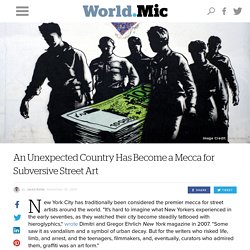
"It's hard to imagine what New Yorkers experienced in the early seventies, as they watched their city become steadily tattooed with hieroglyphics," wrote Dimitri and Gregor Ehrlich New York magazine in 2007. "Some saw it as vandalism and a symbol of urban decay. A Revolution In The Head: The Other Side Of Monty Python. The thing is, rock bands can reform when they're 70 and play the old songs in a lower key, with backing musicians providing cover.
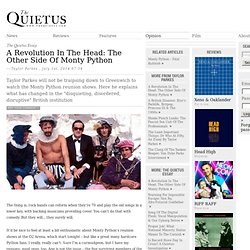
You can't do that with comedy. But they will... they surely will. It'd be nice to feel at least a bit enthusiastic about Monty Python's reunion shows at the O2 Arena, which start tonight – but like a great many hardcore Python fans, I really, really can't. Sure I'm a curmudgeon, but I have my reasons; good ones, too. Age is not the issue – the five surviving members of the Python team are old but hardly doddering, and it's not as if those sketches demand much physical exertion (apart from quite a lot of shouting).
Dubliners. Download 78 Free Online History Courses: From Ancient Greece to The Modern World - Perhaps the foremost cliché about history—from a 1905 quote by George Santayana—says that those who fail to learn the lessons of the past are doomed to make the same mistakes.
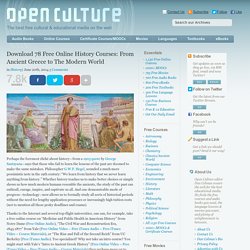
Philosopher G.W.F. Hegel, sounded a much more pessimistic note in the 19th century: “We learn from history that we never learn anything from history.” Whether history teaches us to make better choices or simply shows us how much modern humans resemble the ancients, the study of the past can enthrall, enrage, inspire, and captivate us all. And one demonstrable mode of progress—technology—now allows us to formally study all sorts of historical periods without the need for lengthy application processes or increasingly high tuition costs (not to mention all those pesky deadlines and exams).
Tired of old dominant narratives of dead white Europeans? Howl - Live At The Knitting Factory 1995. We've featured several versions on The Allen Ginsberg Project of Allen reading from his landmark poem, "Howl" (most recently, this one, reading with the Kronos Quartet (featuring a setting by the late Lee Hyla) , but also this one, Allen's 1994 reading as a benefit for Jewel Heart) - here's another, the 1995 reading at The Knitting Factory in New York CityFor the first three parts of the poem, click here.For "Footnote to Howl" see here This recording is also available on the Harper Audio/Caedmon 2004 Allen Ginsberg CD Poetry Collection and the Random House Voice of the Poet- Allen Ginsberg (also from 2004)

13 Lectures from Allen Ginsberg’s “History of Poetry” Course (1975) - If you want to understand poetry, ask a poet.
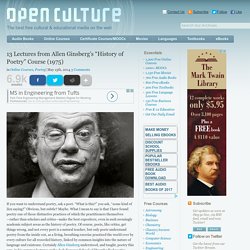
“What is this?” You ask, “some kind of Zen saying?” Obvious, but subtle? Maybe. What I mean to say is that I have found poetry one of those distinctive practices of which the practitioners themselves—rather than scholars and critics—make the best expositors, even in such seemingly academic subject areas as the history of poetry. We’ve previously featured some of Ginsberg’s Naropa lectures here at Open Culture, including his 1980 short course on Shakespeare’s The Tempest and his lecture on “Expansive Poetics” from 1981. Ginsberg references Pound’s pithy text The ABC of Reading and discusses his penchant for “ransack[ing] the world’s literature, looking for usable verse forms.” Neil Gaiman Reads The Graveyard Book, His Award-Winning Kids Fantasy Novel, Chapter by Chapter - Stephen Burt: Why people need poetry. 100 Best First Lines From Novels. April 20, 2011 | 8 Comments » | Topics: Writing Following is a list of the 100 best first lines from novels, as decided by the American Book Review, a nonprofit journal published at the Unit for Contemporary Literature at Illinois State University: 1.
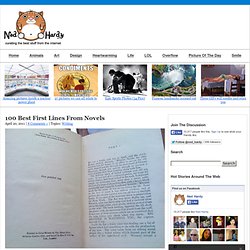
Call me Ishmael. – Herman Melville, Moby-Dick (1851) 2. Ron Mann - Poetry in Motion (1982) Duration: 90 minutes Ron Mann's groundbreaking 1982 documentary feature, Poetry In Motion, remains a treasure-trove of performance and poetry, and poetry-in-performance, and features a stellar group of (mostly North American) poets (twenty-five from a group of sixty-five originally filmed), among them, Allen, Anne Waldman, John Giorno, William Burroughs, Amiri Baraka, Ed Sanders, Robert Creeley, Michael McClure, Gary Snyder, John Cage, and Jim Carroll.
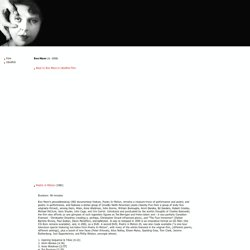
Introduced and punctuated by the acerbic thoughts of Charles Bukowski, the film also affords us rare glimpses of such legendary figures as Ted Berrigan and Helen Adam and - it was partially Canadian-financed - Christopher Dewdney (reading a, perhaps, Christopher Smart-influenced piece), and "The Four Horsemen" (Rafael Barreto-Rivera, Paul Dutton, Steve McCaffery, and bpNichol). It was re-released in 1994 in an innovative format on CD-R0m (the CD-Rom remains available), and, in 2002, as a DVD. 1.
Opening Sequence & Titles [6:23] 2.